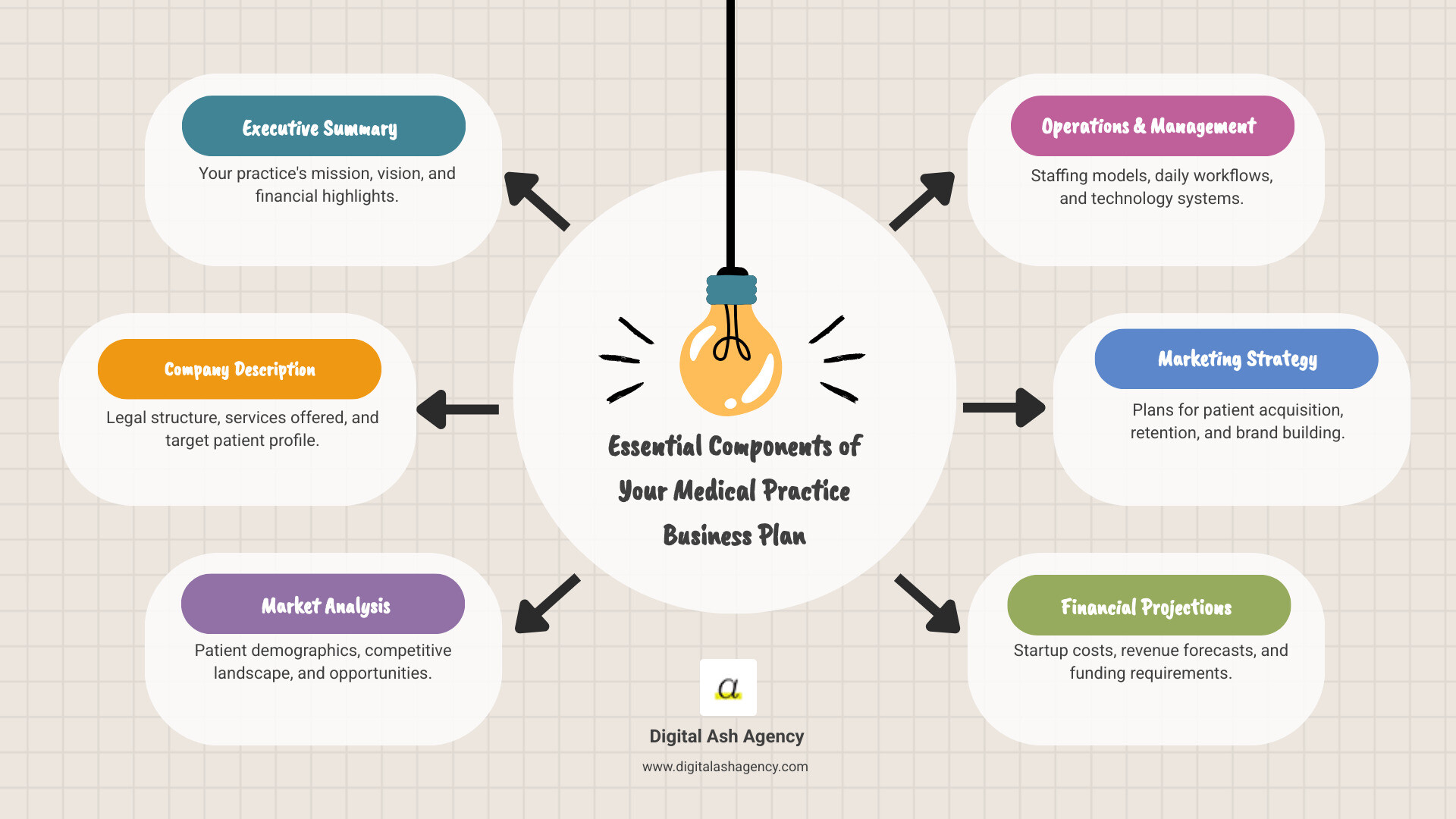
From Healer to Entrepreneur: Why Every Physician Needs a Business Plan
A Medical practice business plan is a comprehensive document outlining your practice's vision, market, operations, and financial strategy. It's your roadmap from vision to victory, essential for securing funding and building a thriving practice.
Core Components of a Medical Practice Business Plan:
- Executive Summary - Your practice's mission, vision, and financial highlights
- Company Description - Legal structure, services, and target patients
- Market Analysis - Demographics, competition, and opportunities
- Operations Plan - Staffing, workflows, and technology systems
- Marketing Strategy - Patient acquisition and retention methods
- Management Team - Key personnel and organizational structure
- Financial Projections - Revenue forecasts, expenses, and funding needs
- Appendix - Supporting documents and exit strategy
Medical school provides brilliant clinical training, but it rarely teaches business. While 44% of doctors work in private practice, most receive no formal business education. As one orthopedic surgeon noted, "Physicians receive no formal business training. I didn't know about HR, compliance, P&L statements, or writing a business plan for a loan."
Despite this gap, a business plan is crucial for securing funding and guiding your practice. In fact, 52% of physicians recognize that getting a business plan is important for their medical practice. This document is your key to navigating healthcare entrepreneurship and achieving your professional goals.
I'm Ashley Gay, a branding expert specializing in helping physicians build successful independent practices. My husband's practice achieved $239K in billings in its first 90 days by following a strategic Medical practice business plan with strong branding and marketing.

Why a Business Plan is Your Practice's Most Critical Instrument
Launching a medical practice without a Medical practice business plan is like performing surgery without a plan. This document is your practice's GPS, surgical roadmap, and financial lifeline all in one.
Securing funding is often the first hurdle where a plan becomes essential. Banks have divisions dedicated to medical practice loans, and they all expect a comprehensive Medical practice business plan. As one banking executive said, "It's hard to see how a successful medical practice can be launched these days without a business plan."
Beyond funding, your business plan provides invaluable strategic direction. It forces you to define your mission, identify your ideal patients, and map out how you'll reach them. This process helps you spot potential problems before they become costly disasters.
For many physicians facing physician burnout, private practice offers a path to gaining autonomy. However, this requires shifting from a clinical to an entrepreneurial mindset. You're suddenly responsible for everything from HR to finance.
This is why 52% of physicians recognize that a business plan is crucial for success. It bridges the gap between being a physician and an entrepreneur, changing hope into an actionable strategy.
Think of it as a clinical consultation for your business: you diagnose the market, understand the competition, and prescribe strategies for healthy growth. A well-crafted plan gives you the confidence and clarity to build the practice you've always envisioned.
Anatomy of a Winning Medical Practice Business Plan
Creating a Medical practice business plan is the foundational step for your dream practice. This 30 to 40-page document is your blueprint for success, essential for securing loans and attracting partners by showing you've considered every detail.

Each section builds on the last to create a compelling narrative of your practice's potential.
The Executive Summary: Your Plan's Abstract
Write this one-to-two-page summary last. Like a journal abstract, it must capture the essence of your entire plan. It's your first impression, so clearly state your mission and vision, the community need you fill, key financial highlights, and your specific funding request.
Company and Service Description
Detail your practice's story here. Specify your practice legal structure (e.g., LLC, PC), consulting a healthcare attorney as needed for legal structure considerations. Describe your specialty and ancillary services, define your target patient profile, and explain how your office location and facilities support your goals.
Market and Competitive Analysis
This section demonstrates market viability. Detail the market size and patient demographics of your area. Analyze your competitors' strengths and weaknesses to identify your competitive edge. A SWOT analysis is an excellent tool for this, revealing opportunities and threats.
Operations and Management Plan
Outline the day-to-day functions of your practice. Include an organizational chart, define key personnel roles and your staffing model. Detail your technology stack, including your EHR system. Explain your billing and coding process (in-house or outsourced) and your plan for HIPAA compliance and daily workflows.

Marketing and Sales Strategy
Since 64% of physicians cite patient attraction as key to success, this section is vital. Your plan should detail patient acquisition strategies, including building an online presence (website, SEO, social media), developing physician referrals, and community outreach. At Digital Ash Agency, we specialize in creating these strategies to help practices thrive.
Financial Projections: The Heartbeat of Your Practice
This section receives the most scrutiny. Detail your startup costs and ongoing operating expenses. Create realistic revenue forecasts based on patient volume and include a break-even analysis. Your plan must include projected Profit and Loss, Cash Flow, and Balance Sheet statements. Be conservative; it's better to exceed modest projections.
Appendix and Exit Strategy
Include all supporting documents here: resumes (CVs) of key personnel, permits and licenses, and detailed market research data. Also, outline an exit plan or succession planning. This demonstrates long-term thinking and reassures investors about the practice's future viability.
Conducting Effective Market Research and Competitive Analysis
Market research is the diagnostic workup for your practice. Before launching your Medical practice business plan, you must thoroughly understand your market to make data-driven decisions, validate your concept, and identify a genuine community need.

Identifying Your Target Patient Population
First, define your ideal patient. Analyze your geographic area and how far patients will travel. Study age, gender, and socioeconomic demographics to tailor your services. Crucially, understand local insurance coverage, as reimbursement realities vary significantly. For example, the uninsured rate in Texas (16.4%) is much higher than in Massachusetts (2.4%), which impacts revenue. You can find state-by-state health insurance coverage data to inform your projections.
Assessing Demand and Need for Your Specialty
Confirm there's a real need for your services. Research population-to-physician ratios using resources like the AAMC's physician specialty data to see if your area is underserved. Analyze local health trends (e.g., an aging population) and identify service gaps, such as long wait times at existing practices or a lack of specialists nearby. These gaps represent your biggest opportunities.
Evaluating the Competition
Strategic positioning requires understanding your competition. Identify local competitors, including other specialists, urgent care centers, and hospital systems. Analyze their services, strengths, and weaknesses (e.g., limited hours, poor reviews). Review their online reputation on sites like Google and Healthgrades to find areas where you can excel. Finally, understand their patient base and payer network participation to identify unmet demand and strategic opportunities for your own insurance contracting.
Crafting Your Financial Plan: Projections and Critical Considerations
Your financial plan is the vital signs monitor for your Medical practice business plan. It's your roadmap to financial viability and is critical for building investor confidence through realistic budgeting and proactive cash flow management.
Projecting Patient Volume and Revenue
Translate your market research into financial projections. Determine your service fees based on market rates. Understand payer reimbursement rates, using the Medicare Physician Fee Schedule as a baseline. Create conservative patient visit forecasts and define your payer mix assumptions (e.g., percentage of Medicare, private insurance, self-pay), as this heavily impacts revenue. Be prepared for payment delays, as first claims can take an average of 60 days to pay.
Estimating Startup and Operational Costs
Underestimating costs is a common pitfall. Create a detailed list of expenses, distinguishing between one-time startup costs (equipment, legal fees, build-out) and recurring operational costs. Key expenses include:
- Staff salaries and benefits (often your largest expense; use tools like Salary.com for research).
- Rent and utilities.
- Medical equipment and supplies.
- Malpractice insurance.
- Billing service costs (typically around 8% of collections if outsourced).
- Technology subscriptions (EHR, practice management).
- Marketing and professional services (accounting, legal).
Refer to the IRS guide to capital expenses for information on how to treat large purchases.
Creating Key Financial Statements for Your Medical Practice Business Plan
Your Medical practice business plan must include three core financial statements projected for 3-5 years. The Profit and Loss (P&L) Statement shows your projected profitability. The Cash Flow Statement is critical for managing liquidity, as it tracks actual cash moving in and out of the practice. The Balance Sheet provides a snapshot of your assets, liabilities, and equity.
Essential financial documents your business plan must include:
- Detailed startup cost breakdown
- Sales forecasts with patient volume and revenue projections
- Projected Profit & Loss statements for 3-5 years
- Projected Cash Flow statements for 3-5 years
- Projected Balance Sheets for 3-5 years
- Break-even analysis
- Funding request and use of funds statement
- Key financial assumptions
Always be realistic and conservative in your projections.
Bringing Your Plan to Life: Marketing, Operations, and Evolution
Your Medical practice business plan is a living document, not a static file. Execution is just the beginning; the most successful practices evolve their plan as they grow.
Developing Your Marketing and Patient Retention Strategy
With 64% of physicians citing patient attraction as a key success factor, a robust marketing strategy is non-negotiable. Your plan should outline how you will:
- Build your brand by defining what makes your practice unique.
- Establish a digital marketing presence through a professional website, local SEO, and social media for patient engagement.
- Develop a referral network by connecting with other physicians and providing excellent care.
- Focus on patient retention, which is more cost-effective than acquisition. Create an exceptional patient experience to build loyalty.
At Digital Ash Agency, we help practices build these marketing and networking strategies. Our support for established medical practices focuses on optimizing both patient acquisition and retention.
The Living Document: Why Your Medical Practice Business Plan Must Evolve
Treat your Medical practice business plan like a patient's chart: monitor it, assess what's working, and make adjustments. It must be a dynamic, not static, tool.
- Conduct regular reviews (quarterly or annually) to track milestones against your projections. Are you hitting your patient volume and revenue targets? If not, why?
- Revisit your goals as your passions and opportunities evolve. Your plan should reflect new directions, like adding a partner or a new service line.
- Adapt to healthcare changes, such as new regulations, technologies, and patient expectations. A flexible plan is essential for survival and growth.
By treating your business plan as a living document, you ensure it remains a powerful tool for long-term success in a constantly changing industry.
Frequently Asked Questions about Medical Practice Business Plans
Physicians often have similar questions when creating a Medical practice business plan. Here are answers to the most common ones.
How long should a medical practice business plan be?
Clarity and quality matter more than page count. A comprehensive plan is typically 30-40 pages, but the goal is to provide all the information a lender or partner needs. Focus on being thorough, not on hitting a specific length.
Can I write a business plan myself, or do I need to hire a consultant?
Yes, you can write your own plan. You know your vision and specialty best. However, it is crucial to get a professional review. Have an accountant check your financial projections and a healthcare attorney review the legal and compliance sections to avoid costly mistakes.
What is the biggest mistake physicians make in their business plans?
The most common mistakes are overly optimistic financial projections and underestimating the marketing budget and timeline. Many physicians assume patients will just show up, but building a patient base takes time and money. Since 64% of physicians cite patient attraction as key to success, your plan must account for a realistic ramp-up period (6-12 months) and potential cash flow gaps caused by insurance payment delays. The best plans are conservative and realistic.
Conclusion: Your Blueprint for a Thriving Practice
Starting on your own practice is a major step. A well-crafted Medical practice business plan transforms hope into a strategic reality. It's your tool for empowerment through planning, giving you the confidence to steer healthcare entrepreneurship, secure funding, and build an autonomous, rewarding career.
However, a great plan requires strong execution, especially in marketing. With 64% of physicians citing patient acquisition as key to success, a powerful marketing and networking strategy is essential.
At Digital Ash Agency, we specialize in helping physicians build thriving independent practices. We develop marketing strategies that build community relationships and ensure your practice stands out, even in competitive markets or when navigating non-compete agreements.
Your Medical practice business plan is the foundation. Bringing it to life requires the right expertise. If you're ready to turn your vision into reality, we're here to help. Get expert help with your new practice strategy and build the practice you've always envisioned.







